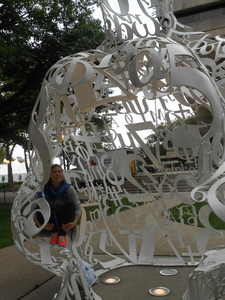Radiation & Climate Gordon Research Seminar: Future Challenges in Using Models and Observations for Understanding Climate Processes
and
Radiation & Climate Gordon Research Conference: Connecting Observations to Global Circulation Modeling Challenges
Every two years a group of scientists, including many of the well-known experts in the field, gather to present and discuss recent results and new ideas in the field of climate science at the Gordon research conference on Radiation and climate. This year the conference was held at Bates College, Maine USA, which is a beautiful venue with good facilities for the meeting as well as opportunities to do sports and be outdoors. The week started with the one-and-a-half-day Gordon research seminar, which is an event for early career scientists, organized by early career scientists (with the support from the Gordon conference organizers). The seminar brought together nearly 70 graduate students and post-docs and a few invited senior scientist. The relatively small size and limited number of intimidating characters made it easy to discuss and meet new people. Apart from the keynote, all the presentations were given by early career scientists, and there were two poster sessions so that everyone had ample opportunity to present their work. After the seminar and a free afternoon, the Gordon conference took place for the rest of the week. It was a small conference with 140 participants, most of them from North American universities and research institutes, but also many Europeans participated and a few traveled from even further. In addition to its small size, the Gordon conference has other special features: there are very few presentations, all speakers are invited because of the relevance of their work, the talks are long and followed by plenty of discussion time, and there are no parallel sessions. The talks within each session where providing complimentary views on a topic, and many times were able to demonstrate how different approaches (different observational techniques, modelling, process studies, etc.) are complementary, and where collaboration or bridges between different approaches are needed. The last session was reserved for the early career scientists, and consisted of four short talks selected from the abstracs for poster presentations, and here I also gave my talk.
For a student, the series of talks by high level scientists, often providing deep insights to their topics, was beyond inspiring. I learned heaps every single day, and overall my understanding of the climate system as a whole, and several of its components, has deepened considerably as a result of the conference. My favorite sessions were ‘Arctic Mixed-Phase Cloud Processes’ and ‘Cirrus from Tropics to Poles’, and I especially liked the talk by David Romps (University of California) titled ‘Theories for the Distribution of Clouds and Humidity in the Tropic’. Another enjoyable aspect was meeting other PhD students working on Arctic mixed phase clouds, and we had very nice discussions during the poster sessions. The highlight was (of course) the chance to meet in person and discuss my work with some notable scientists, and to hear their ideas and advice.
Rosa Gierens
PhD Student
Institute for Geophysics and Meteorology
PhD project: “Micro-physical processes in Arctic mixed phase clouds”
Investigating mixed phase clouds using a synergy of ground based remote sensing measurements
(Poster (GRS and GRC) and oral (GRC) presentation)
http://gop.meteo.uni-koeln.de/ag_crewell/lib/exe/fetch.php?media=publications:abstract:abstract_gierens_grc_20170616.pdf
